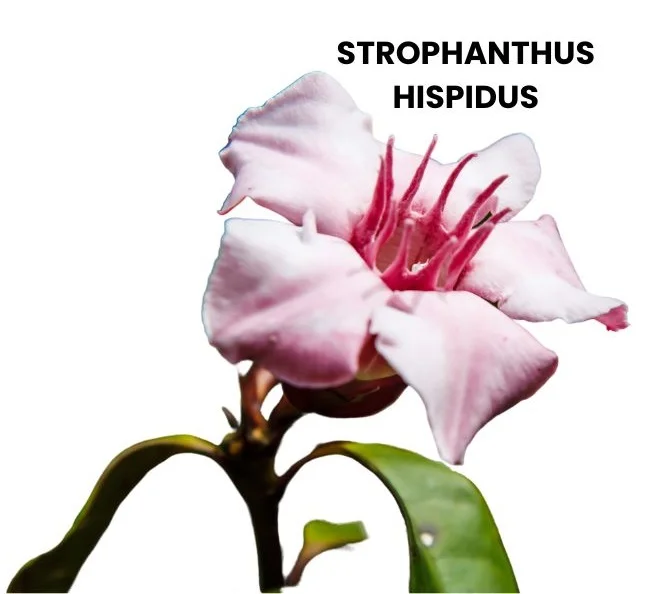Strophanthus Hispidus, commonly known as Kombe-seed, is derived from a plant indigenous to tropical Africa.
This remedy is notable for its effects on the heart and circulatory system.
It enhances the contractile strength of cardiac muscle and is particularly beneficial in conditions of heart weakness, dropsy, and certain respiratory and urinary issues.

SOURCE INFORMATION
Scientific Classification
- Kingdom: Plantae
- Order: Gentianales
- Family: Apocynaceae
- Genus: Strophanthus
- Species: Strophanthus hispidus
Origin
- Native to tropical Africa, Strophanthus Hispidus has been used in traditional African medicine for its potent effects on heart and circulatory health.
Historical Facts
- The seeds of Strophanthus have been used historically to treat various cardiovascular conditions.
- Its use has expanded into modern herbal and homeopathic medicine for heart conditions and dropsy, particularly in cases where other remedies may be less effective.
DRUG PATHOGENESIS
Strophanthus Hispidus affects:
- Cardiac Muscle: Increases contractility, improving heart function and reducing rapidity.
- Diuretic Effect: Helps to manage dropsical accumulations and fluid retention.
- Urinary System: Enhances diuresis and impacts urinary output.
- Respiratory System: Addresses congestion and dyspnea.
KEY CHARACTERISTICS
- Cardiac Stimulant: Enhances heart muscle contraction, improving function in cases of heart weakness and dropsy.
- Diuretic: Effective in reducing fluid retention and managing edema.
- No Gastric Distress: Unlike other cardiac remedies, it does not cause gastric discomfort or have cumulative effects.
- Safe for the Aged: More suitable for older individuals due to its minimal impact on vaso-motor functions.
DETAILED ORGAN SYMPTOMS
HEAD
- Temporal Pains: Headaches with double vision and impaired sight; associated with a flushed face and brilliant eyes.
- Senile Vertigo: Dizziness and balance issues in elderly individuals.
STOMACH
- Nausea: Often accompanied by a strong aversion to alcohol, useful in treating dipsomania (alcohol addiction).
URINARY SYSTEM
- Increased Secretion: Produces more urine, often scanty and albuminous.
FEMALE
- Menorrhagia: Excessive menstrual bleeding.
- Uterine Haemorrhage: Heavy bleeding with a congested uterus.
- Climacteric Pain: Aching in hips and thighs during menopause.
RESPIRATORY SYSTEM
- Dyspnea: Difficulty breathing, especially when climbing.
- Lung Congestion and oedema: Fluid accumulation in the lungs.
- Asthma: Both bronchial and cardiac forms.
HEART
- Pulse Changes: Increased pulse rate with weak, rapid, and irregular heartbeats.
- Cardiac Pain: Pain due to muscular weakness and insufficiency.
SKIN
- Urticaria: Chronic hives with skin irritation.
EXTREMITIES
- Swollen and Dropsical: Fluid retention leading to swelling and anasarca (generalized oedema).
RELATIONSHIP WITH OTHER DRUGS
Compare,
- Digitalis (Digit): Both improve heart function, but Strophanthus acts faster.
- Phosphoric Acid (Phos ac): For similar heart and pulse issues, with a focus on irregular heartbeat and palpitations.
DOSE
- Tincture and 6x Potency: Five to ten drops of the tincture three times a day for acute cases. Use tincture or 6x potency as required.
Frequently Asked Questions
What conditions is Strophanthus Hispidus most effective for?
- It is used for heart weakness, dropsy, fluid retention, and certain respiratory and urinary conditions.
Is Strophanthus Hispidus safe for elderly patients?
- Yes, it is considered safer for older individuals as it does not significantly affect the vaso-motor system.
How should Strophanthus Hispidus be administered?
- It can be administered as a tincture or in homeopathic potencies, with specific dosing depending on the condition and severity.
Glossary of Terms
- Systole: The phase of the heartbeat when the heart muscle contracts and pumps blood.
- Diuretic: A substance that increases urine production to reduce fluid retention.
- Dropsy: Edema or swelling caused by fluid accumulation in tissues.
- Anasarca: Severe generalized edema or swelling.
- Urticaria: A skin condition characterized by hives or welts.
